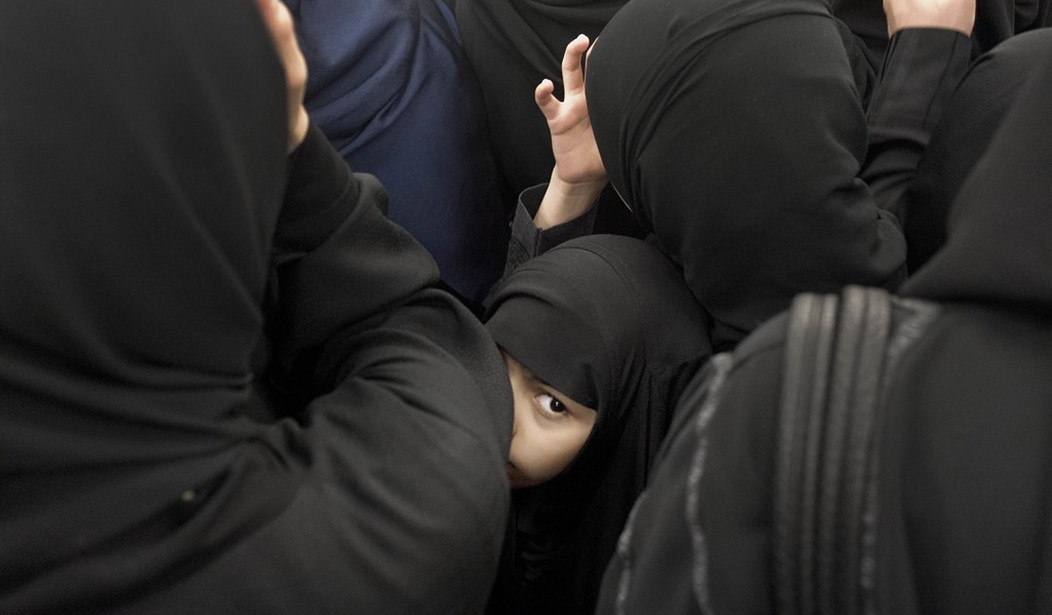Fresh from its racism controversy, the hard-left propaganda organ Teen Vogue (“Get ’em while they’re young” is apparently the motto) appears to be going for a death fatwa, publishing an article Friday entitled “Queer Muslim Heroes to Celebrate This Muslim Women’s Day,” by Zainab Almatwari. Almatwari is a Muslim, but clearly one with views so heterodox that she could easily arouse the murderous ire of many of her coreligionists around the globe. Teen Vogue is doubtless oblivious to the risk it is taking in publishing such an article; the chance to advance “Islamophobia” victimhood propaganda was just too good to pass up.
“Many people,” Almatwari informs us, “might not think to put ‘queer’ and ‘Muslim’ in the same sentence. The two identities, some think, are like water and oil.” She doesn’t explain why this perception exists but gives the strong impression that the problem comes from “Islamophobes” who misunderstand the truly benign and progressive teachings of the cuddly Religion of Peace: “But despite being left unrecognized, queer Muslims exist, and I am proof. In my journey to better understanding my identity, seeing and learning from other queer Muslims have been incredibly validating and reassuring. So, just to remind you that we’re here, we’re queer, and we’re not going anywhere, I compiled a list of queer Muslim heroes.”
“We’re here, we’re queer, and we’re not going anywhere” is sloganeering that gay individuals and groups have used in the West to rebuke and defy alleged “homophobia.” Few, if any, have ever dared to chant this slogan on the streets of Riyadh or Tehran or Lahore, not because those cities and others in the Islamic world are welcoming and accepting of “queer Muslims,” but because those who would do such a thing would be putting themselves immediate danger of death.
Almatwari is also writing in Teen Vogue, where “Islamophobia” in the U.S. is a much larger concern than Sharia-inspired violence against gays in Islamic states. She is not writing in a publication with wide distribution among Muslims, or that is devoted to issues of concern to Muslims. All this makes it likely that the people she thinks need reminding of the “queer Muslim” presence are non-Muslim Americans, not doctrinaire imams and their followers.
Almatwari also complains that “being a queer Muslim seems too complex for the world to handle.” But is it, really? Here again, she doesn’t specify exactly what part of “the world” she has in mind. Would anyone in America really care if Zainab Almatwari informed them that she was a “queer Muslim”? Some Christians would likely try to explain to her that she was on the wrong path; some might even be rude about it. But it is very unlikely that any of them would threaten her. In the Muslim community, however, that likelihood is far greater. Now, why is that?
“Tayah,” writes Almatwari, “is another Queer Muslim woman whose fight against societal standards is far from conventional. Our friendship started with a compliment of each other’s Hijabs and grew quickly to deep discussions about how Queer Muslim figures existed in all Muslim spaces thousands of years ago.” And what happened to them?
Because the left has deemed it “Islamophobia” to discuss the motivating ideology behind jihad violence and Sharia oppression, Teen Vogue wouldn’t dream of telling you that the primary reason why “queer Muslims” are threatened is because of the Islamic holy book: “As for those of your women who are guilty of lewdness, call to witness four of you against them. And if they testify, then confine them to their houses until death takes them, or Allah finds another way for them.” (Qur’an 4:15)
This explanation of that passage is attributed to Muhammad’s companion Ibn Abbas: “The early ruling was confinement, until Allah sent down Surat An-Nur (sura 24) which abrogated that ruling with the ruling of flogging (for fornication) or stoning to death (for adultery).” If a woman is found guilty of adultery, she is to be stoned to death; if she is found guilty of fornication, she gets 100 lashes (cf. 24:2).”
A later tradition has one of the people who are identified as Muhammad’s companions observing, “When the revelation descended upon the Messenger of Allah, it would affect him and his face would show signs of strain. One day, Allah sent down a revelation to him, and when the Messenger was relieved of its strain, he said, ‘Take from me: Allah has made some other way for them. The married with the married, the unmarried with the unmarried. The married gets a hundred lashes and stoning to death, while the unmarried gets a hundred lashes then banishment for a year.’”
Teen Vogue would never dare tell you any of this, for fear of being considered “Islamophobic.” Instead, it implies that the only problems “queer Muslims” face are from racist, redneck, “Islamophobic” yahoos in the U.S. As such, they are leading both non-Muslim and Muslim girls down a very risky path. Risky in innumerable ways.
Robert Spencer is the director of Jihad Watch and a Shillman Fellow at the David Horowitz Freedom Center. He is author of 21 books, including the New York Times bestsellers The Politically Incorrect Guide to Islam (and the Crusades) and The Truth About Muhammad. His latest book is Rating America’s Presidents: An America-First Look at Who Is Best, Who Is Overrated, and Who Was An Absolute Disaster. Follow him on Twitter here. Like him on Facebook here.










Join the conversation as a VIP Member